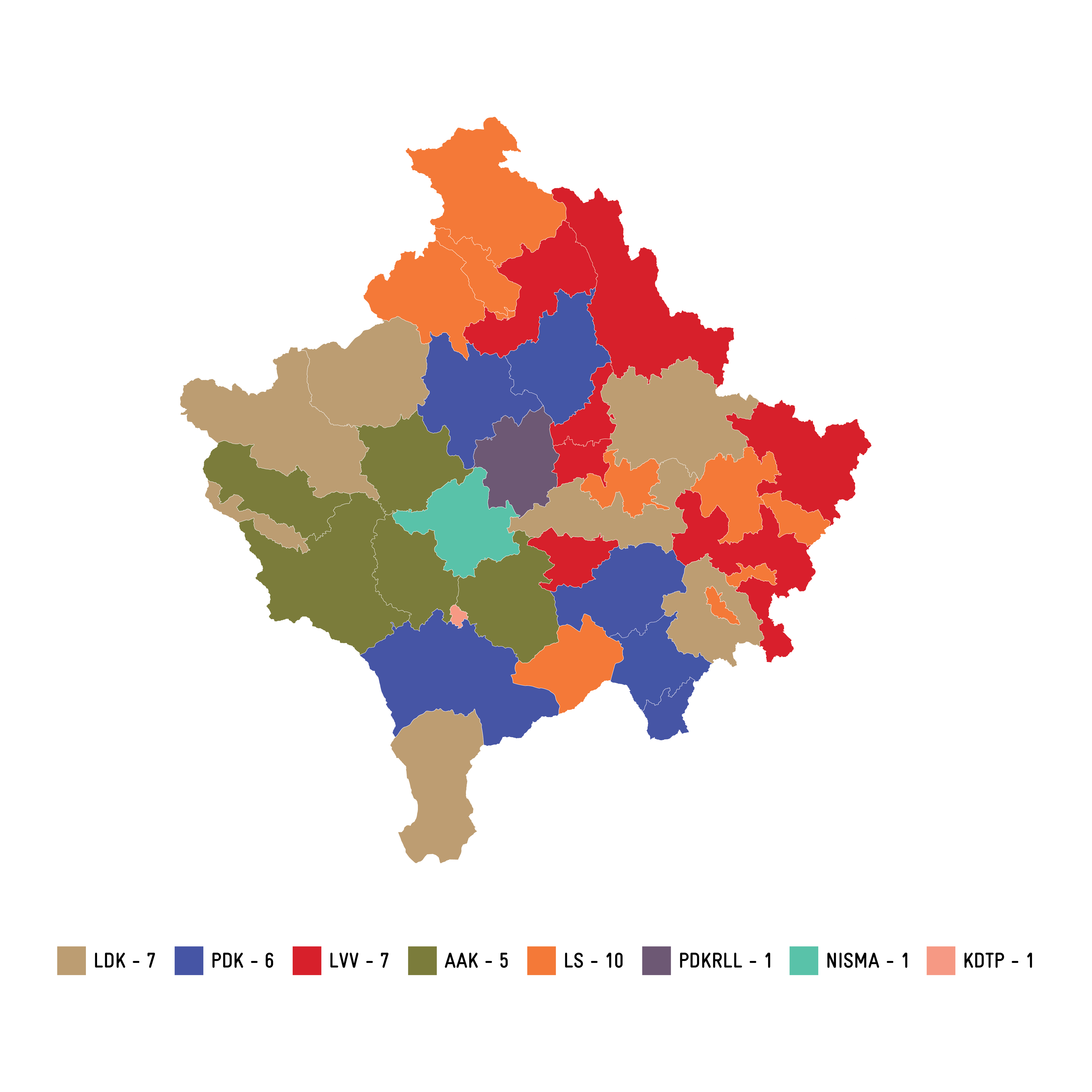More than 430,000 citizens voted for a second time on Sunday, November 9, in 18 Kosovo municipalities, where mayoral runoff contests were held. The first round of elections on October 12 had produced outright winners in 20 municipalities — who earned more than 50% of the vote — making this Sunday’s runoff decisive for the remaining cities that did not have a majority.
In several municipalities, the results were largely predictable given the wide gaps in the first round of voting. Meanwhile, the fiercest contests took place in Prishtina and South Mitrovica, where candidates were separated by very narrow margins. The race was also tight in Fushë Kosovë, where the Democratic League of Kosovo (LDK), which had held the seat for 25 years, faced a serious challenge from Vetëvendosje (VV).
The competitive race in South Mitrovica led to higher voter turnout than in the first round, resulting in a change in power.
Kosovo’s municipalities ended up being divided almost evenly among political parties: VV and LDK will each govern seven municipalities; the Democratic Party of Kosovo (PDK) will lead six; the Alliance for the Future of Kosovo (AAK) will govern five; while Srpska Lista (LS) regained control in the ten Serb-majority municipalities. The other, smaller parties will lead the remaining three municipalities.
The second round of local elections unfolded amid an institutional deadlock. Eight months after the February parliamentary elections, Albin Kurti of VV failed to secure the necessary votes to form a government. This week, VV’s second nominee, Glauk Konjufca, is expected to make another attempt to earn the required votes.
Losses hidden under the cloak of victories
In select cities, party leaders stepped out to celebrate victories, but kept the losses incurred on the night tucked beneath their rolled-up sleeves.
Of the bigger losses, only Xhafer Gashi from LDK in Obiliq took responsibility for his defeat so openly that he resigned from all party positions. For the next four years, Obiliq will be governed by Halil Thaçi of VV.
Party leaders chose the country’s major centers as stages for their celebrations. VV’s victory in South Mitrovica brought acting Prime Minister Albin Kurti to the city, while LDK leader Lumir Abdixhiku and his team gathered in Prishtina’s Skanderbeg Square to mark Përparim Rama’s re-election. Meanwhile, PDK leader Memli Krasniqi headed to Prizren to celebrate Shaqir Totaj’s re-election, and AAK leader Ramush Haradinaj traveled to Suhareka to join Bali Muharremaj’s festivities.
Rama’s win in Prishtina was LDK’s biggest triumph. Following a term marked by difficulties in implementing major projects, Rama centered his campaign on blaming the incumbent VV-led government for obstructing his campaign promises. He accused his opponent in the election, acting Minister of Culture Hajrulla Çeku, of blockading him. While in the first round the two were separated by just over 500 votes, Rama widened the gap in the runoff, winning 51.54% of the vote – 2,809 more than Çeku, who received 48.46%.
A very tight race in South Mitrovica took place between Arian Tahiri, a new political figure from PDK and outgoing deputy mayor, and Faton Peci, a VV candidate and former Minister of Agriculture, Forestry and Rural Development.
With a margin of only 47 votes in the first round, Peci went on to win the runoff with 53.47%, while Tahiri received 46.53%. PDK lost control of the municipality just four years after regaining it under Bedri Hamza.
The defeat in Mitrovica was overshadowed by PDK’s celebrations in Prizren, where the party managed to retain power for another term. There, incumbent mayor Shaqir Totaj was re-elected with 53.86% of the vote, while Artan Abrashi of VV received 46.14%. PDK also held on to power in Vushtrri, where Ferit Idrizi defeated Sylejman Meholli of VV, and in Kaçanik, where Sabedin Vishi won against VV’s Jeton Raka.
In other major cities, Peja set a record by re-electing Gazmend Muhaxheri of LDK as mayor for a fourth term. Although this victory reflects the party’s stability in the city, Muhaxheri celebrated alone, without his party leader.
LDK managed to retain control in Vitia, Junik and Dragash. However, it lost two municipalities, including its once-unshakable stronghold of Fushë Kosovë, which it had governed for 25 years. This time, the party’s long-time mayor, Burim Berisha, did not run; his replacement, Besnik Osmani, was defeated by VV’s Valon Prebreza, a new political figure in the race. VV also defeated LDK in another of its traditional bastions, Obiliq, where Halil Thaçi of VV beat Xhafer Gashi with 51.09% to 48.91% of the vote.
In this round, LDK faced VV in a bid to reclaim its former stronghold of Gjilan. However, the incumbent mayor, VV’s Alban Hyseni, secured another four-year term with a decisive victory, winning 61.06% of the vote to Arbër Ismajli’s 38.94%.
Meanwhile, AAK managed to retain power in four municipalities. Ardian Gjini secured enough votes to begin his third term as mayor of Gjakova, defeating VV’s Ardian Gola.
AAK also won a third consecutive term in three other municipalities: Bali Muharremaj in Suhareka, Smajl Latifi in Rahovec and Zenun Elezaj in Klina, all retained their posts following the runoffs.
Without a majority in municipal assemblies
In the first round of elections, municipal assemblies were also elected; however, in most municipalities, no majorities were formed in favor of the elected mayors. While this also occurred in the 2021 local elections, the lack of a majority in the assemblies could affect each mayor’s ability to advance their governing program.
Municipal assemblies play a key role in local decision-making, as any decision requires the approval of a majority of members present. Kosovo’s decentralized governance system grants municipalities considerable executive powers – from water supply and the quality of primary and secondary education to road maintenance and the operation of primary healthcare centers.
In Prishtina, LDK’s elected mayor Përparim Rama controls only 29.10% of the assembly, while more than half of its members come from PDK (22.44%), VV (21.88%) and AAK (10.02%).
In Peja, re-elected mayor Gazmend Muhaxheri of LDK holds 39.96% of seats, while more than 50% belong to AAK, PDK and VV.
In Mitrovica, although VV defeated PDK, the latter holds 40.24% of the municipal assembly – around 17% more than the winning party.
In Gjilan, although VV’s Alban Hyseni secured another term, he also lacks a majority with 38.19% of the seats, while PDK and LDK together hold around 40%.
In Gjakova, AAK’s Ardian Gjini controls only 32.35%, while around half of the assembly is composed of members from VV, PDK and LDK. In Prizren, although PDK won the mayoral race, it holds only 32.34% of seats, followed by VV and LDK.
Despite the lack of majorities in most municipal assemblies, governing coalitions are expected to form in the coming days to ensure functioning municipalities.
Feature image: Ferdi Limani


